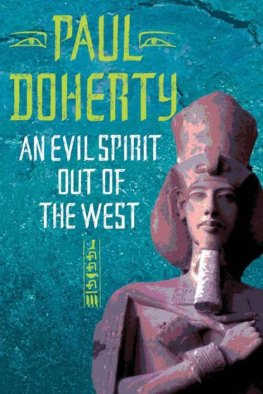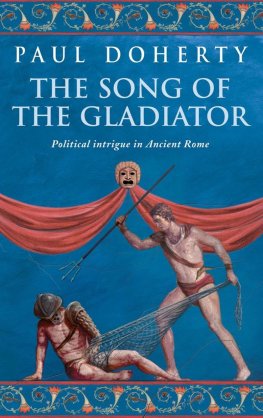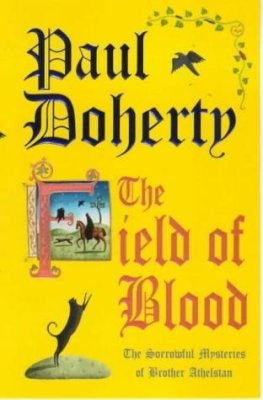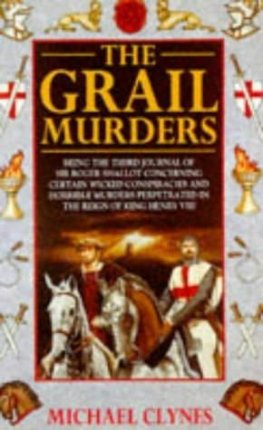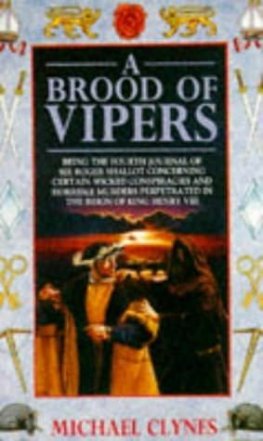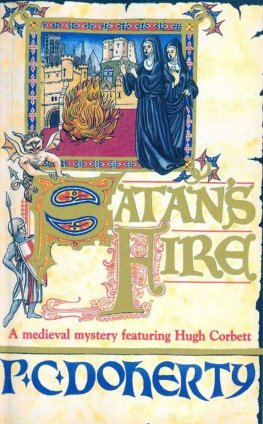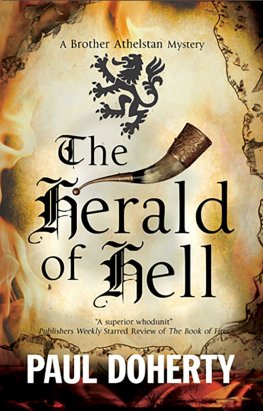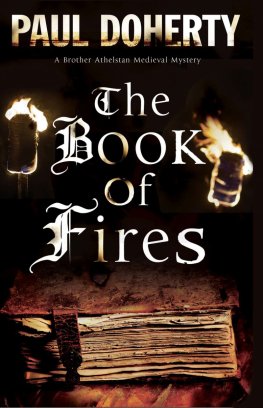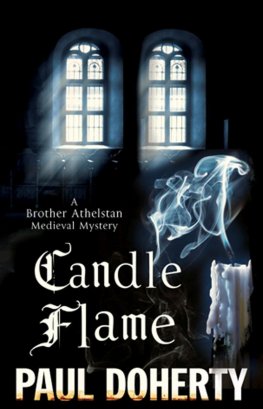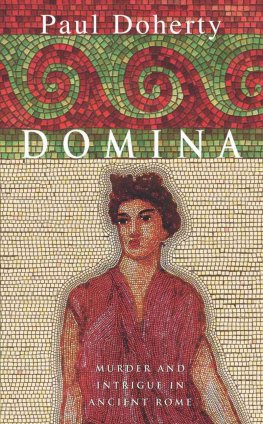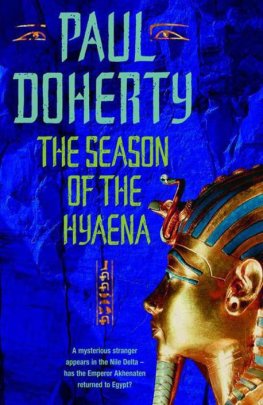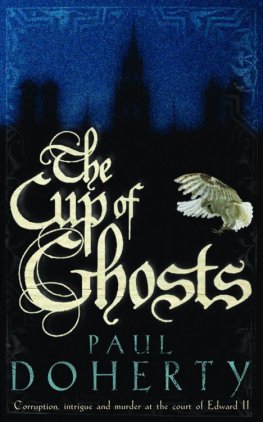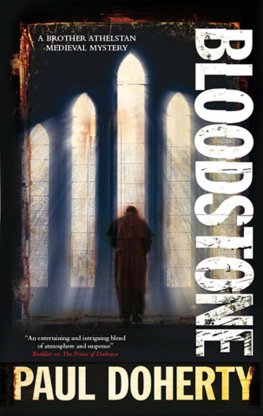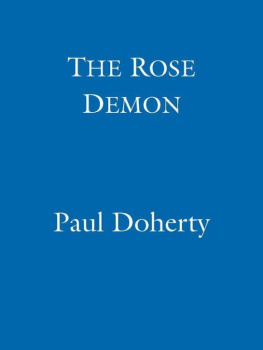Paul Doherty - An Evil Spirit Out of the West
Here you can read online Paul Doherty - An Evil Spirit Out of the West full text of the book (entire story) in english for free. Download pdf and epub, get meaning, cover and reviews about this ebook. year: 2012, publisher: Headline, genre: Adventure. Description of the work, (preface) as well as reviews are available. Best literature library LitArk.com created for fans of good reading and offers a wide selection of genres:
Romance novel
Science fiction
Adventure
Detective
Science
History
Home and family
Prose
Art
Politics
Computer
Non-fiction
Religion
Business
Children
Humor
Choose a favorite category and find really read worthwhile books. Enjoy immersion in the world of imagination, feel the emotions of the characters or learn something new for yourself, make an fascinating discovery.
- Book:An Evil Spirit Out of the West
- Author:
- Publisher:Headline
- Genre:
- Year:2012
- ISBN:9780755350438
- Rating:5 / 5
- Favourites:Add to favourites
- Your mark:
- 100
- 1
- 2
- 3
- 4
- 5
An Evil Spirit Out of the West: summary, description and annotation
We offer to read an annotation, description, summary or preface (depends on what the author of the book "An Evil Spirit Out of the West" wrote himself). If you haven't found the necessary information about the book — write in the comments, we will try to find it.
An Evil Spirit Out of the West — read online for free the complete book (whole text) full work
Below is the text of the book, divided by pages. System saving the place of the last page read, allows you to conveniently read the book "An Evil Spirit Out of the West" online for free, without having to search again every time where you left off. Put a bookmark, and you can go to the page where you finished reading at any time.
Font size:
Interval:
Bookmark:
Paul Doherty
An Evil Spirit Out of the West
Introduction
The Eighteenth Dynasty (15501323 BC) marked the high point, if not the highest point, of the Ancient Egyptian Empire, both at home and abroad; it was a period of grandeur, of gorgeous pageantry and triumphant imperialism. It was also a time of great change and violent events, particularly in the final years of the reign of Amenhotep III and the swift accession of the Great Heretic Akhenaten, when a bitter clash took place between religious ideologies at a time when the brooding menace of the Hittite Empire was making itself felt.
I was very fortunate in being given access to this ancient document which alleges to be, in the words of a more recent age, the frank and full confession of a man who lived at the eye of the storm: Mahu, Chief of Police of Akhenaten and his successors. Mahu emerges as a rather sinister figure responsible for security a job description which can, and did, cover a multitude of sins. This confession seems to be in full accord with the evidence on Mahu that has been recovered from other archaeological sources be it the discoveries at El-Amarna, the City of the Aten, or the evidence of his own tomb, which he never occupied. A keen observer of his times, Mahu was a man whose hand, literally, was never far from his sword (see the Historical Notehere).
Mahu appears to have written his confession some considerable time after the turbulent years which marked the end of the Eighteenth Dynasty. He kept journals, which he later transcribed, probably during the very short reign of Rameses I (c. 1307 BC). Mahus original document was then translated in the demotic mode some six hundred years later during the seventh century BC, then copied again during the Roman period in a mixture of Latin and the Greek Koine. His confession, which I have decided to publish in a trilogy, reflects these different periods of translation and amendment; for instance, Thebes is the Greek version of Waset, and certain other proper names, not to mention hieroglyphs, are given varying interpretations by the different translators and copiers.
Mahus confession does not, unfortunately, clarify certain vexed problems of the period. For example, just how long did Amenhotep III reign? Did he allow his son to become full Co-regent during his lifetime? How long did Akhenaten actually reign? Nevertheless, Mahus account does bring to life the bloody struggle which tore Egypt apart almost 3,500 years ago. It vividly describes the intrigue and conflict, the vaulting ambition of men and women who fought to the death over the dream of Empire.
O you who takes away hearts
and accuses hearts.
(Spell 27: The Book of the Dead)
Chapter 1
I have swallowed their magic.
I call on their spirits.
My thoughts race like chariot teams ready for war,
Hot for the heat of battle.
I taste their blood in my mouth.
I see their Kas come before me,
Released from the Underworld,
Ready to haunt me.
I speak of those who have gone before,
Gulped by Eternal Night,
Swallowed by the destroyer,
Their souls hacked up like joints in the cauldron.
The star-riven darkness parts
A name slips back, memories, images,
And yet its like crossing shifting sands,
Or peering through the heat haze of a desert.
I stand and watch them come
But I cannot make out their form or face.
So many names, so many souls, so many thoughts,
so many memories,
So, so long ago.
Only you, Rameses, Lord of the Two Lands,
Strong in arm and form,
Horus Incarnate, Master of the Twin Crowns,
Keeper of the Diadem,
Mighty Pharaoh.
You should know, for you were with us,
in spirit from the beginning.
This is my hymn to you:
The Heavens are Overcast
Their Lights are Darkened.
The pillars of Heaven tremble,
The bones of the Earth Gods shatter.
The earth is quiet under your feet.
The creatures of the world
Have seen our Pharaoh
Appear in power.
The King is Master of Wisdom,
He is Possessor of Mens Necks.
Ah well, so the fire is laid. A fire burns away the dross of the years. So, who am I? Why, I am Mahu, former General of the great Pharaohs, friend of the great Pharaohs, now I dwell alone in a little mansion beside the Nile where palm trees throng. Over their green-skinned tops I can make out, through the mist, the dim ghosts of mountains. Those mountains know the secrets. They hold the truth about the One whose name cannot be uttered, and the rest. Oh yes, the rest.
I have begun my confession on the nineteenth day of Akhit, the Season of the Inundation; the waters of the Nile are fat and swollen, sweeping life into the Black Lands. The Dog Star has risen high into the eastern sky; now it has gone, as have the white flashes of the ibis bird. All memories! The Pharaohs scribes have also come and gone, so has the Eyes and Ears of Pharaoh: with his cobra eyes and beak-like nose he reminds me of General Rameses, thin lips always twisted in a smirk or was it a grimace? Even now Rameses ghost stands in the shadows with the rest, watching with those close-set, ever-shifting eyes.
They have brought me food, writing pens and ink pallets, rolls of papyrus, a horn knife and a smoothing stone. They have also found the journals I kept over the years: these will serve as pricks to memory. I am to write down all that has happened. They want my confession, so Pharaoh shall have it once the dross of the past has been burned away, bringing back those glory days of the Magnificent One, Amenhotep III, his fat paunch and coarse thighs gleaming with perfumed sweat. Amenhotep the Magnificent, Lord of the Two Lands, Wearer of the Divine Plumes, sitting on a pleasure stool, his own daughter squatting libidinously on his lap, long legs dangling down, in one fair hand a blue lotus which had flowered at noon and in the other a silver-edged whip. Next is Queen Tiye, small of face and fierce of heart, a Queen whose dreams were haunted by her mysterious god. Ah, and here comes Maya! Old Smooth-Skin with his perfume-drenched robes and face painted more heavily than any heset girl from a temple. Ever-smiling Maya who liked to dress in womens clothes, his face as bland as the full moon and a heart just as changeable. Mayas lips were wet, red and full as if he had sucked on blood, that sneering mouth ever ready to sing his own praises: When I began I was very good, so ran the inscription on his tomb, but when I finished I was brilliant.
The shadows shift, to reveal Pentju the physician, cunning and just as dangerous. Behind him is Huy, the glory of Pharaoh, followed by Horemheb the great warrior, with his thickset body, square stolid face and the eyes of a ferocious panther. Rameses? Ah well, Rameses always stands in Horemhebs shadow. And the others? Oh yes, theyll appear. Nefertiti, the beautiful woman has arrived. She walks, as she always did, her magnificent head tilted back, those strange blue eyes peering out from under heavy lids. She is followed by her daughter Ankhesenamun, just as eerily beautiful and just as treacherous. Ankhesenamun wears her perfumed wig bound by a golden fillet; her sloe eyes are ringed with black kohl; a silver gorget circles her beautiful throat, and her braided, beaded skirt slaps provocatively against those exquisitely curved thighs. She wears one gold-topped sandal whilst the other is held effortlessly in her hand. Behind her is gentle loving Tutankhamun, innocent dark eyes in a smiling boys face. Dominating them all, like a brooding cloud which covers the sky, is the Heretic! The Veiled One, whose name cannot be uttered. They all come to Mahu, and where does Mahu begin but at the very beginning?
I was born popping like some rotten seed out of my mothers womb, so rough, so hard she died within the month, or so common report had it. My father Seostris, a Standard Bearer in the Medjay, was not present at my birth. Surely you know who the Medjay are? Auxiliary troops from the South. Many years ago, during the Season of the Locust, the Medjay decided to throw their lot in with the Egyptians when they waged war with fire and sword, by land and sea, against the Hyksos: barbarians who turned the Delta town of Avaris into their strong-hold and threatened to bring all Egypt under their heavy war-club. So impudent did they become, that the Hyksos Prince sent a message to the Pharaoh of the time to keep the hippopotami in his pool quiet because they disturbed his sweet slumbers in Avaris.
Font size:
Interval:
Bookmark:
Similar books «An Evil Spirit Out of the West»
Look at similar books to An Evil Spirit Out of the West. We have selected literature similar in name and meaning in the hope of providing readers with more options to find new, interesting, not yet read works.
Discussion, reviews of the book An Evil Spirit Out of the West and just readers' own opinions. Leave your comments, write what you think about the work, its meaning or the main characters. Specify what exactly you liked and what you didn't like, and why you think so.

